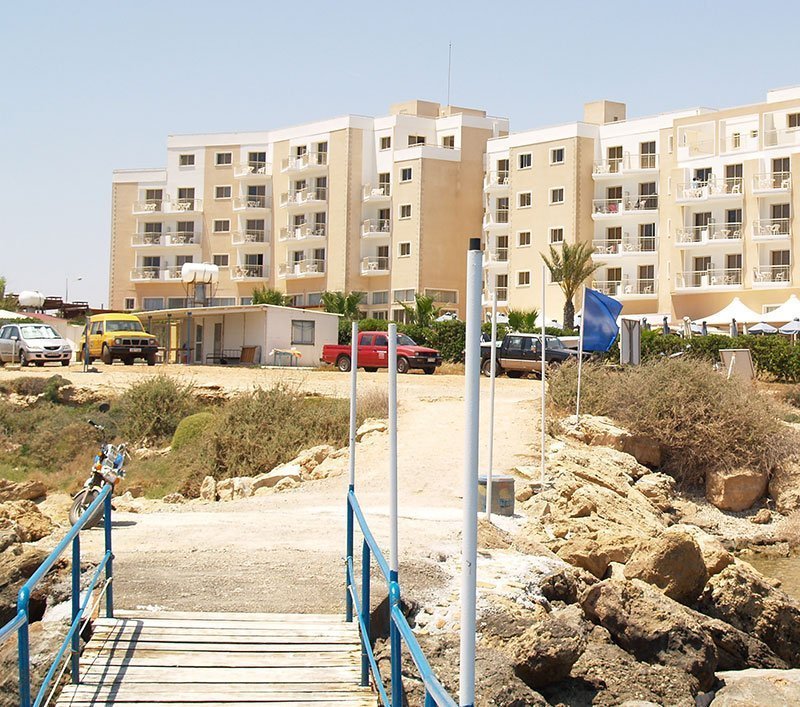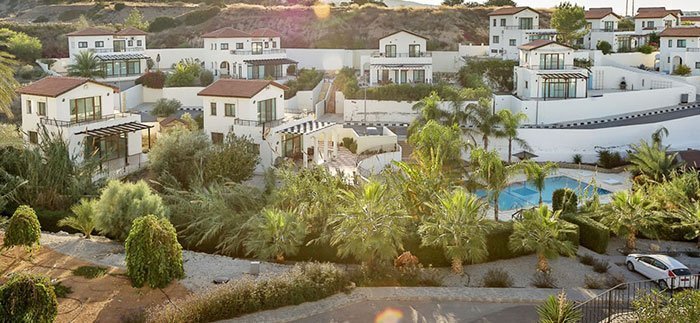Buying Property in Cyprus
“A Guide for the Inexperienced Investor”
Situated at the eastern end of the Mediterranean, Cyprus has in recent times expertly combined business with pleasure by carving out a niche as a popular location for offshore business whilst taking advantage of its natural beauty and climate to become a busy tourist hot spot. A look at the Cypriot climate guaranteed sunshine (320 days a year) the sunniest place in Europe, with summers of 32C, and winters of 16C, long sandy beaches washed by clear blue seas, wonderful food, a rich and ancient local culture, very low crime rates, and a welcoming population. Factor in some of the most affordable house prices in the Mediterranean (properties in Cyprus are on average 20% – 30% lower in prices than Portugal, 30% – 40% lower than Spain and 50% – 60% lower than Italy and France), a very favorable tax regime, cheap flights, and you have a fair description of Cyprus.
However, it must be noted that when we talk about Cyprus, we are for the purposes of this feature only talking about the south. The country has been divided since the Turks invaded and took control of the northern third of the island in 1974. The political situation however, should in no way act as a deterrent to potential investors in the South. In fact, the country has been rapidly growing in popularity for property investors. Finally, we must address the issue of investing in the North and note that the risk of loosing investment on this side of Cyprus is a very real threat. This is because only Turkey legally recognizes the “Turkish Republic of Northern Cyprus”, and therefore the legal position of title deeds issued in the TRNC over the last three decades is precarious to say the least. Therefore, buying in the north is probably only for the more determined or adventurous bargain hunter.
Obtaining finance for a property purchased in Cyprus is relatively straightforward. Most commercial banks in Cyprus are authorized to offer mortgage facilities to local as well as foreign applicants to assist in the purchase of their property. Typically, Cypriot banks can lend between 60% and 80% of the value of the property with the term usually fixed at seven to ten years

Permission to Buy Property
The logistics for expatriates buying a property in Cyprus are relatively simple compared to many countries. Non-Cypriots are permitted to buy, for their personal use, either an apartment or a house on a building site not exceeding three donums (4.012,50 square meters) or a piece of land not exceeding three donums for the purpose of erecting a house within a reasonable time.
Non-Cypriots, after having signed the agreement, are obliged to get permission from the Council of Ministers by written application. However, this permission is generally granted as a matter of course to all bona fide purchasers. In the meantime there are no restrictions on signing a contract, taking possession of your purchased property and living in it, as you are the legal owner of the property according to law. Membership of the EU had lifted some of the current restrictions on property ownership, such as the right for a foreign buyer to own only one property on no more than 2,675 sq m of land. Moreover, the fact that now other EU resident will be able to live and work on the island.
Acquiring the Title Deed
Transfer of ownership from vendor to purchaser is processed by the Cyprus Land Registry Office. To protect the buyer’s rights to the property and provide additional safeguards, it is advisable that the contract of sale be in writing and registered at the District Land Registry Office within sixty days from the contract date. When issued, the title deed will be registered in the name of the buyer and will be recorded in the Registry archives. At any time after the purchase, the buyer may sell or dispose of the property at will, provided that he/she has a valid contract.


Investors Foreign for Safeguards Legal
The Constitution of Cyprus establishes the equality of all persons irrespective of their nationality and includes provisions for the protection of human rights of all persons without discrimination. Contrary to the risks inherent in the purchase of property in some countries, Cyprus has never been involved in the nationalization of any sector of the economy, or in the expropriation of property owned by non-Cypriots. Indeed, the Republic has often guaranteed foreign investments jointly and severally with local participants – consistent with its efforts to create a favorable climate for such investments.
Taxes associated with the purchase of property in Cyprus
- Real Estate Transfer Tax. This is necessary to transfer the freehold into the name of the buyer and is levied on a progressive scale starting at 5% up to CYP10,000 increasing in five steps up to a maximum of 8% above CYP75,000.
- For residents there is an Immovable Property Tax based on the value of the property at a rate of 0.2% between CYP100,000 and CYP250,000; 0.3% up to CYP500,000; and 0.35% over CYP500,000. The first CYP100,000 is exempt.
- The buyer is also liable for stamp duty. This is charged at a rate of 0.15% on the first CYP100,000, and 0.2% above this threshold.
- Depending on the size of the property, local authority taxes range from 0.1% to 0.5% per annum to cover refuse collection, sewerage, street lighting etc.
Foreigners who seek to invest in immovable property in Cyprus may be classified in the following four main categories
- Retired residents These people settle permanently in Cyprus upon retirement. The Cyprus Government gives a series of incentives to retired people, including duty-free facilities and very low taxation of their income, which emanates from abroad. These people may also enjoy, under certain circumstances, the benefits of the Double Taxation Treaty of their country of origin with Cyprus, if there is one. Cyprus has double-taxation agreements with Austria, Bulgaria, Canada the People’s Republic of China, the Czech Republic, Denmark, Egypt, France, Germany, Greece, Hungary, India, Ireland, Italy, Kuwait, Malta, Norway, Poland, Romania, Russia, (Armenia, Belarus, Kurdistan, Moldova, Tajikistan, Turkmenistan and Ukraine) Slovakia, South Africa, Sweden, Syria, the United Kingdom, the United States, Yugoslavia (Serbia and Montenegro) and other countries.
- Employed residents This category includes foreigners who live indefinitely or for a fixed period in Cyprus as employees, either of their own offshore company or of a local or offshore firm, and who choose to purchase their own property in Cyprus rather than live in rented premises. In this category are also included offshore companies purchasing houses for their Directors.
- Holiday Makers – Speculators These people purchase properties in Cyprus as holiday homes or for possible permanent places of abode upon retirement, or for the sale thereof with a reasonable profit at a later stage. Profits realized by foreigners from the sale of immovable property may be expatriated under certain restrictions.
- Business investors These are foreign individuals and companies who acquire property in Cyprus for tourist or industrial purposes, making use of the location and climate of Cyprus, the excellent infrastructure and the various incentives offered for these purposes, especially in the area of taxation. To this end, the Free Trade Zone structure of Cyprus offers great inducements ranging from the provision of all modern facilities to low tax or tax incentive status.








